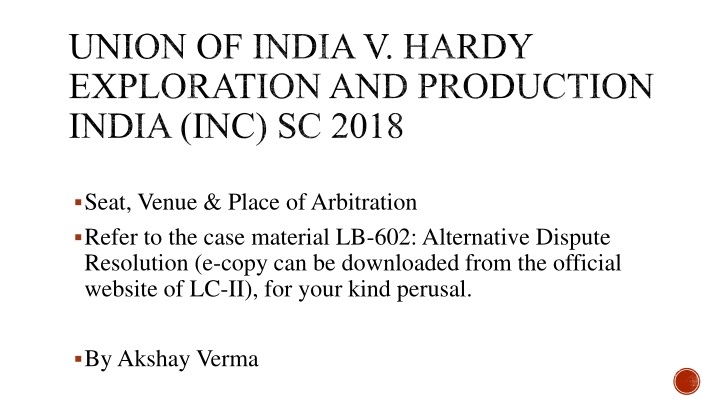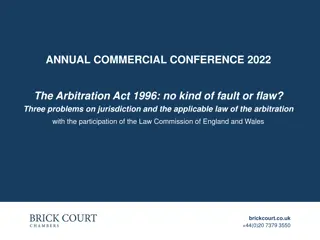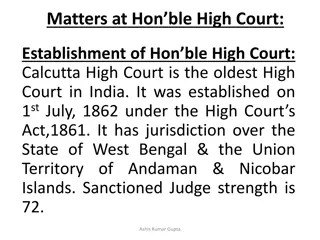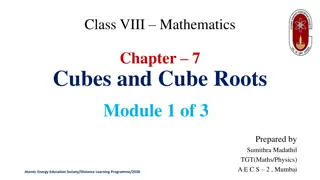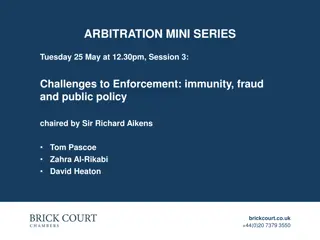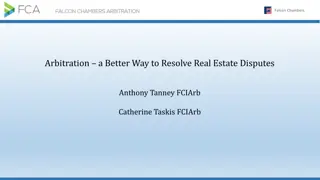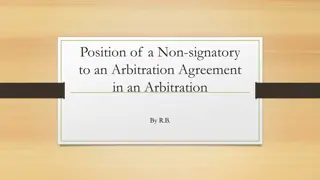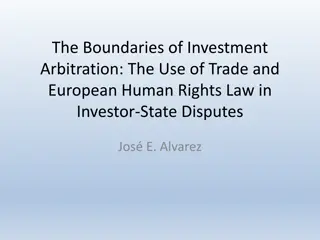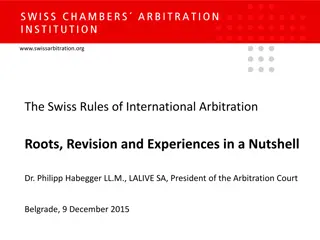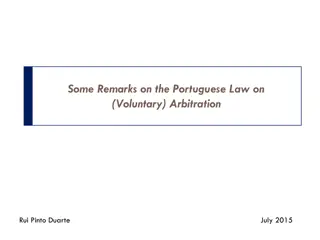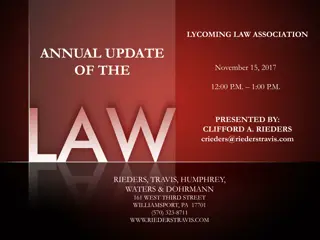Arbitration Venue vs. Seat Jurisdiction Issue in Union of India v. Hardy Exploration and Production India (Inc) SC 2018
This case involves a dispute between Hardy Exploration and Production India (Respondent) and the Government of India (Appellant) regarding the arbitration venue and seat. The issue revolves around the jurisdiction of Indian courts in post-award arbitration proceedings when the arbitration agreement specifies the venue but not the seat. The contentions of the parties highlight differing opinions on the applicable laws and the courts' jurisdiction under the Arbitration and Conciliation Act, 1996.
Download Presentation

Please find below an Image/Link to download the presentation.
The content on the website is provided AS IS for your information and personal use only. It may not be sold, licensed, or shared on other websites without obtaining consent from the author.If you encounter any issues during the download, it is possible that the publisher has removed the file from their server.
You are allowed to download the files provided on this website for personal or commercial use, subject to the condition that they are used lawfully. All files are the property of their respective owners.
The content on the website is provided AS IS for your information and personal use only. It may not be sold, licensed, or shared on other websites without obtaining consent from the author.
E N D
Presentation Transcript
UNION OF INDIA V. HARDY EXPLORATION AND PRODUCTION INDIA (INC) SC 2018 Seat, Venue & Place of Arbitration Refer to the case material LB-602: Alternative Dispute Resolution (e-copy can be downloaded from the official website of LC-II), for your kind perusal. By Akshay Verma
FACTS: A production-sharing contract (PSC) was entered into between Hardy Exploration and Production (India) Inc. (Respondent) and the Government of India (Appellant) for the extraction, development and production of hydrocarbons in a geographic block in India. Dispute arose between the parties, on account of which the matter was referred to arbitration under PSC. As per PSC, the venue of arbitration was provided as Kuala Lumpur, unless otherwise agreed between the parties. The Arbitral Tribunal held the meeting at Kuala Lumpur and signed the award rendered in favour of the Respondent. The award was challenged by UOI under Section 34 of the Arbitration and Conciliation Act,1996 before the Delhi High Court.
CONTD. On the other hand, the respondent sought enforcement of the award before the Delhi High Court. On July 09, 2015, the Learned Single Judge held that the Indian Courts had no jurisdiction to entertain the said application. The order passed by the Single Judge was challenged before the Division Bench of the Delhi High Court, which was further dismissed by the said Bench. An appeal by Special Leave Petition was preferred by UOI whereby the Division Bench of the Supreme Court referred the matter to the larger Bench of the Supreme Court in exercise of its power under Order VI Rule 2 of the Supreme Court Rules, 2013.
ISSUE: When the arbitration agreement specify the venue for holding the arbitration sittings by the arbitrators but does not specify the seat , then on what basis and by which principle, the parties have to decide the place of seat which has a material bearing for determining the applicability of laws of a particular country for deciding the post award arbitration proceedings ?
APPELLANTS CONTENTIONS: There is no specific mention of juridical seat in the arbitral agreement but reference is to the venue only. Referred to Sumitomo Heavy Industries Ltd. vs. ONGC Ltd. & Others , in which the Court held that in absence of specific choice on the law of arbitration agreement, it would be determined by the substantive law of the contract. Courts in India have jurisdiction to entertain an application under Section 34, Arbitration and Conciliation Act, 1996, as part I of the said act applies.
RESPONDENTS CONTENTIONS: Courts in India don t have jurisdiction to entertain an application under Section 34,Arbitration and ConciliationAct, 1996, if the venue is Outside India. The decision rendered in Sumitomo Heavy Industries Ltd. vs. ONGC Ltd. & Others has lost its efficacy for the reason that: it was rendered under the Arbitration Act, 1940, which now stands repealed byArbitrationAct, 1996 it was rendered in relation to Section 9 of the Foreign Awards (Recognition and Enforcement)Act, 1961, which also now stands repealed by 1996Act. a) b) The effect of UNCITRAL Model Law for deciding the question of Seat is not yet certain.
OBSERVATIONS: 1. Laws Governing theArbitration 2.Application of Part I, 1996Act 3. Non-application of Part I, 1996Act 4. Seat theory 5. UNCITRAL Model Law on Place ofArbitration 6. Determination or Order 7. General Observations
1. LAWS GOVERNING THE ARBITRATION 1. The proper law of the contract, i.e. the law governing the contract which creates the substantive rights of the parties, in respect of which the dispute has arisen. 2. The proper law of the arbitration agreement, i.e. the law governing the obligation of the parties to submit the disputes to arbitration, and to honour an award. 3. The curial law, i.e. the law governing the conduct of the individual reference. The curial law governs' the manner in which the reference is to be conducted; the procedural powers and duties of the arbitrator; questions of evidence; the determination of the proper law of the contract. In the absence of express agreement, there is a strong prima facie presumption that the parties intend the curial law to be the law of the seat of the arbitration, i.e., the place at which the arbitration is to be conducted, on the ground that that is the country most closely connected with the proceedings
2. APPLICATION OF PART I, 1996 ACT 1. Bhatia International v. Bulk Trading SA(2002): The provisions of Part I would apply to all arbitrations and to all proceedings relating thereto. Where such arbitration is held in India the provisions of Part I would compulsory apply and parties are free to deviate only to the extent permitted by the derogable provisions of Part I. In cases of international commercial arbitrations held out of India provisions of Part I would apply unless the parties by agreement, express or implied, exclude all or any of its provisions
3. NON-APPLICATION OF PART I, 1996 ACT Videocon Industries Limited v. UOI (2011) 1. The parties had agreed that the arbitration agreement shall be governed by laws of England. This necessarily implies that the parties had agreed to exclude the provisions of Part I of theAct. It was held that the Delhi High Court did not have the jurisdiction to entertain the petition filed by the respondents under Section 9 of the Act and the mere fact that the appellant had earlier filed similar petitions was not sufficient to clothe that High Court with the jurisdiction. 2. BharatAluminium Company (BALCO) v. KaiserAluminium (2012) The provision contained in Section 2(2) of the Arbitration Act, 1996 is not in conflict with any of the provisions either in Part I or in Part II of theArbitrationAct, 1996. In a foreign seated international commercial arbitration, no application for interim relief would be maintainable under Section 9 or any other provision, as applicability of Part I of the 1996 Act is limited to all arbitrations which take place in India. Similarly, no suit for interim injunction simplicitor would be maintainable in India, on the basis of an international commercial arbitration with a seat outside India. Part I of the Arbitration Act, 1996 is applicable only to all the arbitrations which take place within the territory of India.
CONTD. 3. UOI v. Reliance Industries Limited (2015) The applicability of Part I of the Act can be excluded by necessary implication if it is found that on the facts of the case, either the juridical seat of the arbitration is outside India or the law governing the arbitration agreement is a law other than Indian law. 4. IMAX Corporation v. M/S E-City Entertainment (I) (2017) In the present case, the parties expressly agreed that the arbitration will be conducted according to the ICC Rules of Arbitration and left the place of arbitration to be chosen by ICC. ICC in fact, chose London as the seat of arbitration after consulting the parties. this is a clear case of the exclusion of Part I. Where the parties have not expressly chosen the law governing the contract as a whole or the arbitration agreement in particular, the law of the country where the arbitration is agreed to be held has primacy.
4. SEAT THEORY The law of the seat or place where the arbitration is held, is normally the law to govern that arbitration. Terms seat and place are often used interchangeably. But the term Venue can not be used interchangeably with seat or place The seat theory : An arbitration is governed by the law of the place in which it is held, which is the seat (or forum or locus arbitri) of the arbitration. Locus arbitri- law of the place where arbitration is to take place. When a place is agreed upon, it gets the status of seat which means the juridical seat. When only the term place is stated or mentioned and no other condition is postulated, it is equivalent to seat and that finalises the facet of jurisdiction. But if a condition precedent is attached to the term place , the said condition has to be satisfied so that the place can become equivalent to seat.
5. UNCITRAL MODEL LAW ON PLACE OF ARBITRATION Article 20. Place of arbitration: analogous to Section 20, Arbitration and Conciliation Act, 1996 Article 31(3) of the UNCITRAL Model Law: analogous to Section 31(4), Arbitration and Conciliation Act, 1996 On a perusal of Articles 20 and 31(3) of the UNCITRAL Model Laws, it is inferred that the parties are free to agree on the place of arbitration or it is interpretably deduced from the clause and the other concomitant factors. The other mode, as Article 20 of the UNCITRAL Model Law provides, is that where the parties do not agree on the place of arbitration, the same shall be determined by the Arbitral Tribunal. Such a power of adjudication has been conferred on the Arbitral Tribunal. Article 31(3) clearly stipulates that the Award shall state the date and the place of arbitration as determined in accordance with Article 20(1).
6. DETERMINATION OR ORDER Determination or order. The expression determination signifies an effective expression of opinion which ends a controversy or a dispute by some authority to whom it is submitted under a valid law for disposal. The expression order must have also a similar meaning, except that it need not operate to end the dispute. Determination or order must be judicial or quasi-judicial. A determination is a final judgment for purposes of appeal when the trial court has completed its adjudication of the rights of the parties in the action. The said test clearly means that the expression of determination signifies an expressive opinion. In the instant case, there has been no adjudication and expression of an opinion. Technically, the word place cannot be used as seat. To elaborate, a venue can become a seat if something else is added to it as a concomitant. But a place unlike seat, at least as is seen in the contract, can become a seat if one of the conditions precedent is satisfied. It does not ipso facto assume the status of seat.
7. GENERAL OBSERVATIONS The absence of the word only which is found in Article 1(2) of the Model Law, from Section 2(2) of the Arbitration Act, 1996 does not change the content/import of Section 2(2) as limiting the application of Part I of the Arbitration Act, 1996 to arbitrations where the place/seat is in India. The place of arbitration has to be agreed upon between the parties and in case of failure of agreement, the Arbitral Tribunal is required to determine the same taking into consideration the convenience of the parties. The word determination requires a positive act to be done. In the case at hand, the only aspect that has been highlighted is that the arbitrator held the meeting at Kuala Lumpur and signed the award. That does not amount to determination. The clause is categorical. The sittings at various places are relatable to venue. It cannot be equated with the seat of arbitration or place of arbitration. The word determination has to be contextually determined. As is evident, there is no agreement in reference to the seat of Arbitration. As far as determination is concerned, there has been no determination.
DECISION: Kuala Lumpur is not the seat or place of arbitration. The order passed by the Delhi High Court is set aside. Resultantly, the appeal stands allowed. High Court is requested to deal with the application preferred under Section 34 of the Act as expeditiously as possible. There shall be no order as to costs.
CONCLUSION The terms seat and place are often used interchangeably, but not with the venue . The sittings at various places are relatable to venue. It cannot be equated with the seat of arbitration or place of arbitration. The place of arbitration has to be agreed upon between the parties and in case of failure of agreement, the Arbitral Tribunal is required to determine the same taking into consideration the convenience of the parties. Parties may well choose a particular place of arbitration precisely because its lex arbitri (law of arbitration) is one which they find attractive. Nevertheless, once a place of arbitration has been chosen, it brings with it its own law. If parties choose a juridical seat of arbitration outside India and provide that the law which governs arbitration will be a law other than Indian law, Part I of the Act would not have any application and, therefore, a court in India could not have jurisdiction to entertain such objections under Section 34 in such a case.
